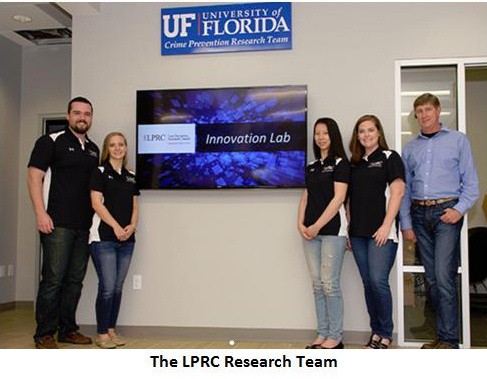When thinking of retail theft, many envision teenagers shoplifting candy bars. Obviously, it’s much more than that. More than $44 billion in merchandise goes missing across the United States each year, driving up prices for paying customers and filling the coffers of gangs and terrorist organizations. In cities around the United States, a growing number of violent drug store robberies are putting employees and customers at risk, while data breaches siphon off in minutes what would take years to steal from stores.
Through collaborations with computer engineers, sociologists and political scientists across campus as well as retail organizations across the country, Dr. Read Hayes of the University of Florida and the team with the Loss Prevention Research Council, or LPRC, works to thwart these criminals.
“It’s an opportunity to use academic research to solve real-world problems,” Hayes said. “Retail crime can be very dangerous and violent, but even when it’s not, it affects everyone.”
Factors from the height of the shelves to the placement of the cash registers influence criminal decision-making, and the University of Florida and the LPRC want to understand them all. Through partnerships with a growing number of retail chain stores, LPRC researchers test innovations in theft prevention, watching how customers and criminals alike react.
Just as interesting to the scientists are the deterrents that criminals don’t notice. Some, like hidden cameras, are meant to be invisible. But most are meant to be seen, because the goal of retail theft prevention isn’t to catch thieves, but deter them from stealing in the first place.
Global Commitment to LP Research and Development
The LPRC conducts research to develop retail theft, crime and loss control solutions that improve the performance of its members and the retail industry. Founded in 2001 by leading retailers and Dr. Read Hayes in an effort to support the evidence-based needs of loss prevention decision-makers, the LPRC has grown to over 45 major retail chains. To date the LPRC has conducted over 90 real world loss prevention research projects for retailers and partners. The scope of these projects includes:
- Large-scale field experiments to provide decision-makers with impact and ROI data
- Development of statistical models for shortage reduction
- Employee dishonesty and shoplifter dynamics research
- Supply chain and violent crime research and development
The Loss Prevention Research Council conducts rigorous asset protection research and development combining professionals with practical loss prevention experience and expertise with university-trained research backgrounds. The team consists of full time and part time administrative personnel, project managers, and researchers.
Innovation, collaboration and evaluation have been a focal point of the LPRC since its inception. All of the research and development projects conducted by the team and the LPRC solution partners have provided a wealth of information and practical learning experiences that help to prevent retail theft and other crimes, improve safety in the stores, and ultimately reduce retail shrink.
Sharing the Message
At LP Magazine, our goal is to provide an additional channel to help communicate the LPRC message. Beginning in April 2016 the team at the Loss Prevention Research Council has generously agreed to provide their insights and expertise to the loss prevention community by contributing ongoing articles to LP Magazine, which will be shared through our digital offerings. Our first article was provided by Brittany Griffin on “Maximizing the Millennial Potential in the Loss Prevention Industry,” discussing how our ability to effectively leverage skills, convey information and feedback will directly impact productivity. We are looking forward to more thoughts from the entire LPRC research team, and are excited to share these insights with the loss prevention community on a regular basis.
To learn more about Dr. Hayes, the research efforts of the University of Florida, and the Loss Prevention Research Council, we encourage you to read “The Science of Stealing” from the University of Florida.
You can also read the articles provided by Dr. Hayes in his regular column in the print edition of LP Magazine, as well as the feature article “From Store Detective to Research Scientist with the Loss Prevention Research Council” with Dr. Hayes.



